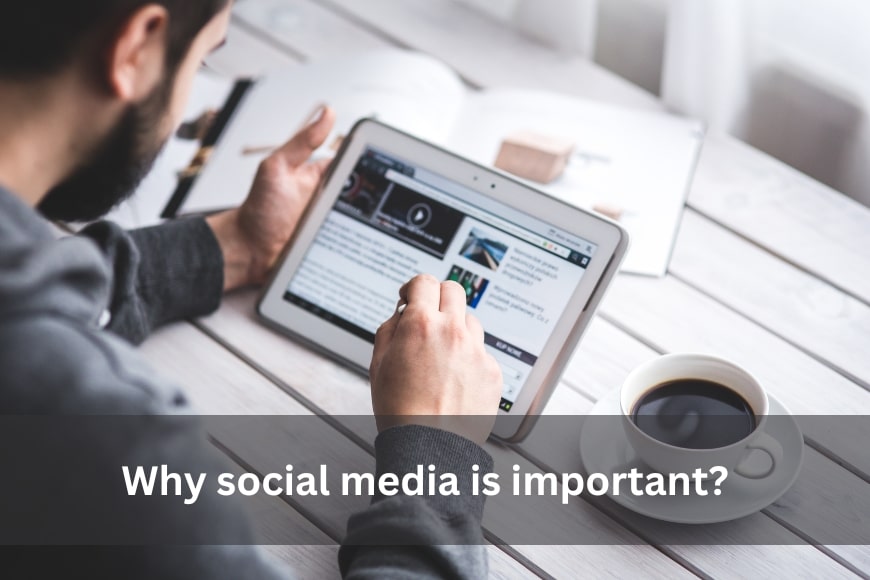Why social media is important?

The Significance of Social Media in Modern Life
In today’s dynamic landscape, Social Media has transcended from a mere trend to an indispensable tool for individuals and businesses alike. Its influence on our daily lives is beyond dispute, shaping how we communicate, connect, and conduct business. The events of 2020 further underscored the pivotal role social media plays in our lives.
Defining Social Media:
Formally defined as “websites and computer programs enabling communication and information sharing on the internet,” social media serves as an informal platform for mass communication. Rooted in the Latin word ‘socius,’ meaning friend, and ‘media’ referring to mass communication, it has become an integral part of our lives.
The Impact of Social Media in 2024 and Beyond:
Today, almost everyone is part of a social media platform, whether on Twitter, Instagram, Facebook, or LinkedIn. When harnessed effectively, these platforms, with the expertise of a social media agency, have the power to transform lives. Let’s delve into some key aspects that highlight the contemporary relevance of social media.
1. Maintaining Meaningful Connections:
In our fast-paced lives, physically meeting friends and family daily can be a challenge. However, platforms like social media have adeptly bridged this gap, allowing us to stay in touch, share achievements, and engage with colleagues or close ones.
2. Fostering Diverse Opinions:
Diversity of thought is a cornerstone of progress. Social media provides a space to express our perspectives and connect with like-minded individuals. It empowers us to advocate for vital issues and engage in fruitful discussions.
3. Providing Respite Through Entertainment:
Social media offers more than just work-related interactions. It serves as a refuge for entertainment, offering tailored content such as memes, news, and videos, providing a welcome break from our hectic schedules.
4. Facilitating Learning and Exploration:
A hub for discovering new interests and learning, social media allows us to follow people who share our passions, join communities, and consume diverse content from various sources.
5. Building Communities:
Social media serves as a conduit for connecting with individuals who share our values and interests. Joining groups and collaborating on projects fosters a sense of community and enables advocacy for causes we hold dear.
Types of Social Media Platforms:
There are several prominent types of social media platforms, each catering to distinct user preferences:
Social Networking Sites: Prominent platforms like Facebook, Twitter, and LinkedIn facilitate networking and widespread communication.
Media Sharing Sites: Platforms like Instagram and YouTube focus on visual content, allowing users to share photos and videos.
Social Blogging Sites: Medium and Tumblr are popular platforms for content creation and distribution.
Discussion Sites: Informative platforms like Reddit and Quora enable discussions, offering insights into trends and sentiments.
Social Media in Numbers:
Understanding the sheer impact of social media requires a look at its staggering statistics:
Global Users: 3.6 billion people engage with social media, representing 49% of internet users worldwide.
Daily Usage: The average internet user spends 144 minutes per day on social media.
India’s Influence: With over 326.1 million users in 2018, India is projected to reach 447.9 million users by 2023, boasting the highest number of Facebook users globally.
The Vital Role of Social Media For Businesses:
In the contemporary landscape, businesses can’t thrive without a robust social media presence. Its significance for businesses encompasses:
Brand Building: Social media offers an unparalleled platform to establish and strengthen brand identity, creating a human connection with the audience.
Growth: It facilitates lead generation, boosts sales, and increases website traffic, contributing to business expansion.
Communication: Social media serves as a channel for sharing achievements, managing reputation, and informing about philanthropic efforts.
Research and Insights: It provides valuable customer insights, competitor analysis, and market positioning, aiding in strategic decision-making.
Advertising: Social media enables cost-effective advertising, leveraging influencers, and utilizing content as a potent marketing tool.
Diverse Applications of Social Media:
From education to activism, social media’s versatility is evident:
– Students connect and collaborate on assignments.
– Business owners engage with customers and promote products.
– Journalists break news and engage with their audience.
– Activists raise awareness and mobilize support for causes.
Conclusion:
Since its inception in 1997, social media has evolved into a transformative force, reshaping how we communicate. Its trajectory remains dynamic, ensuring its enduring relevance in the foreseeable future. As we navigate this digital age, it is imperative to wield social media responsibly, discerning between valuable information and potential misinformation. In the grand scheme of things, social media is poised to remain an integral part of our lives, potentially for generations to come.











